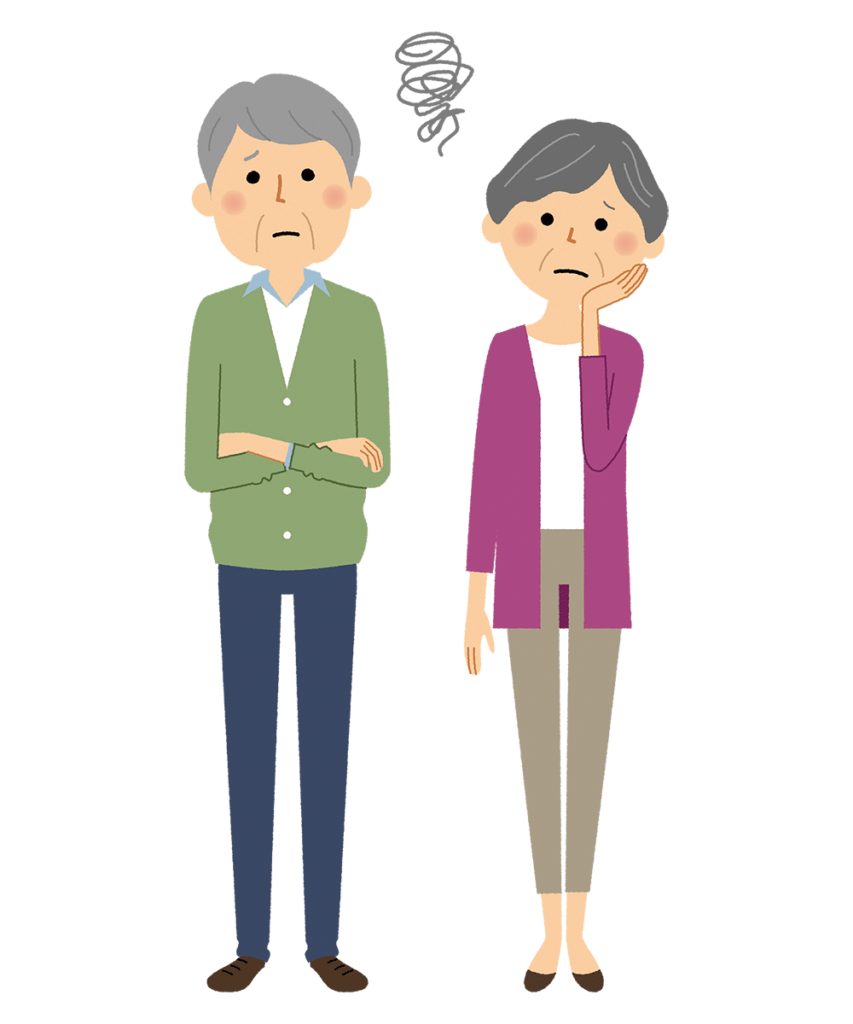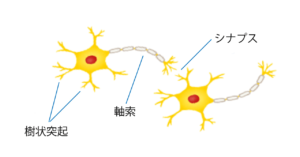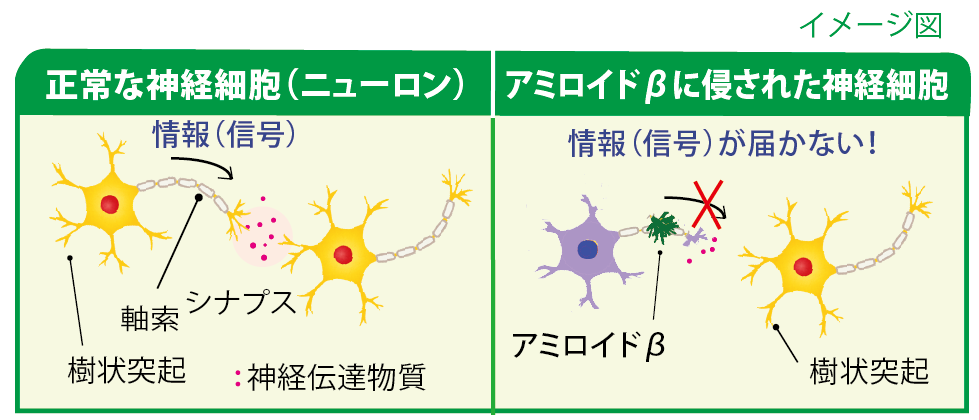
Followings are the characteristics for MCI patients.
- Other people such as family or friend notices memory lapses, and the person with MCI worries about losing his or her memory.
- Behaviors in routine daily life are normal.
- General cognitive function is normal.
- The memory dysfunction exists that cannot be explained only by the effect of aging and educational back ground
- The person with MCI is not the patient of Dementia.
Dementia is not the name for disease but a syndrome – usually of a chronic or progressive nature – in which there is deterioration in memory and cognitive function (i.e. the ability to process thought) beyond what might be expected from normal ageing. It affects memory, thinking, orientation, comprehension, calculation, learning capacity, language, and judgement. Dementia is caused by abnormal brain changes, and typical diseases causing Dementia are as follows;
- Alzheimer’s Disease
Alzheimer’s disease is an irreversible, progressive brain disorder through atrophy of brain that slowly destroys memory and thinking skills and, eventually, the ability to carry out the simplest tasks. In most people with the disease—those with the late-onset type—symptoms first appear in their mid-60s. Alzheimer’s disease is the most common cause of dementia among older adults.
The disease is named after Dr. Alois Alzheimer. In 1906, Dr. Alzheimer noticed changes in the brain tissue of a woman who had died of an unusual mental illness. Her symptoms included memory loss, language problems, and unpredictable behavior. After she died, he examined her brain and found many abnormal clumps (now called amyloid plaques) and tangled bundles of fibers (now called neurofibrillary, or tau, tangles).
These plaques and tangles in the brain are still considered some of the main features of Alzheimer’s disease. Another feature is the loss of connections between nerve cells (neurons) in the brain. Neurons transmit messages between different parts of the brain, and from the brain to muscles and organs in the body. Many other complex brain changes are thought to play a role in Alzheimer’s, too.
This damage initially appears to take place in the hippocampus, the part of the brain essential in forming memories. As neurons die, additional parts of the brain are affected. By the final stage of Alzheimer’s, damage is widespread, and brain tissue has shrunk significantly.
- Vascular contributions to cognitive impairment and dementia (VCID)
Vascular contributions to cognitive impairment and dementia (VCID) are conditions arising from stroke and other vascular brain injuries that cause significant changes to memory, thinking, and behavior. Cognition and brain function can be significantly affected by the size, location, and number of brain injuries. Two forms of VCID—vascular dementia and vascular cognitive impairment (VCI)—arise as a result of risk factors that similarly increase the risk for cerebrovascular disease (stroke), including atrial fibrillation (a problem with the rhythm of the heartbeat), high blood pressure, diabetes, and high cholesterol.
Symptoms of VCID can begin suddenly and progress or subside during one’s lifetime. VCID can occur along with Alzheimer’s disease. People with VCID almost always have abnormalities in the brain on magnetic resonance imaging scans. These abnormalities include evidence of prior strokes, often small and asymptomatic, as well as diffuse changes in the brain’s “white matter”—the connecting “wires” of the brain that are critical for relaying messages between brain regions. Microscopic brain examination shows thickening of blood vessel walls called arteriosclerosis and thinning or loss of components of the white matter.
- Lewy body dementia (LBD)
Lewy body dementia (LBD) is a disease associated with abnormal deposits of a protein called alpha-synuclein in the brain. These deposits, called Lewy bodies, affect chemicals in the brain whose changes, in turn, can lead to problems with thinking, movement, behavior, and mood. Lewy body dementia is one of the most common causes of dementia.
Diagnosing LBD can be challenging. Early Lewy body dementia symptoms are often confused with similar symptoms found in other brain diseases like Alzheimer’s or in psychiatric disorders like schizophrenia. Also, Lewy body dementia can occur alone or along with other brain disorders.
There are two diagnoses of LBD—dementia with Lewy bodies (DLB) and Parkinson’s disease dementia. The earliest signs differ but reflect the same biological changes in the brain. Over time, people with dementia with Lewy bodies or Parkinson’s disease dementia may develop similar symptoms.
- Frontotemporal disorders (Pick’s disease)
Damage to the brain’s frontal and temporal lobes causes forms of dementia called frontotemporal disorders.
Frontotemporal disorders are the result of damage caused by specific proteins to neurons (nerve cells) in parts of the brain called the frontal and temporal lobes. As neurons die in the frontal and temporal regions, these lobes atrophy, or shrink. Gradually, this damage causes difficulties in thinking and behaviors normally controlled by these parts of the brain. Many possible symptoms can result, including unusual behaviors, emotional problems, trouble communicating, difficulty with work, or difficulty with walking.
Frontotemporal disorders are forms of dementia caused by a family of brain diseases known as frontotemporal lobar degeneration (FTLD). Dementia is a severe loss of thinking abilities that interferes with a person’s ability to perform daily activities such as working, driving, and preparing meals. Other brain diseases that can cause dementia include Alzheimer’s disease and multiple strokes. Scientists think that FTLD is the most common cause of dementia in people younger than age 60. Roughly 60 percent of people with FTLD are 45 to 64 years old.
People can live with frontotemporal disorders for up to 10 years, sometimes longer, but it is difficult to predict the time course for an individual patient. The disorders are progressive, meaning symptoms get worse over time. In the early stages, people may have just one type of symptom. As the disease progresses, other types of symptoms appear as more parts of the brain are affected.
No cure or treatments that slow or stop the progression of frontotemporal disorders are available today. However, research is improving awareness and understanding of these challenging conditions. This progress is opening doors to better diagnosis, improved care, and, eventually, new treatments.
Why does the memory lapse or memory loss increase ?
Function and Mechanism of Neuron

神経細胞(ニューロン)のしくみ
The cognitive ability of things is generated by the neuronal activities. Neuron is basically composed of neuronal cell body having the nucleus and neurites extending from the neuronal cell body.
Axon, which is the long neurites, works to transfer the electric signal (stimulus) to other neuronal cells and sensory organs, and Dendrite, which is the short neurites, works to receive the electric signal (stimulus) coming from other neuronal cells, respectively. Thus, the axon and dendrite play such important roles in cognitive abilities.
Axon and dendrite develops as one grows. However, they start waning due to the influence of amyloid β and phosphorylated tau proteins at the late teens, followed by atrophy and/or diminish. As a result, cognitive impair- ment and memory dysfunction are caused. Thereafter, the frequency of memory lapse and/or memory loss are gradually increasing, resulting in finally causing such as Alzheimer type dementia.

Signs and Symptoms of Dementia
Dementia affects each person in a different way, depending upon the impact of the disease and the person’s personality before becoming ill. The signs and symptoms linked to dementia can be understood in three stages.
Early stage: the early stage of dementia is often overlooked, because the onset is gradual. Common symptoms include:
- forgetfulness
- losing track of the time
- becoming lost in familiar places.
Middle stage: as dementia progresses to the middle stage, the signs and symptoms become clearer and more restricting. These include:
- becoming forgetful of recent events and people’s names
- becoming lost at home
- having increasing difficulty with communication
- needing help with personal care
- experiencing behaviour changes, including wandering and repeated questioning.
Late stage: the late stage of dementia is one of near total dependence and inactivity. Memory disturbances are serious and the physical signs and symptoms become more obvious. Symptoms include:
- becoming unaware of the time and place
- having difficulty recognizing relatives and friends
- having an increasing need for assisted self-care
- having difficulty walking
- experiencing behaviour changes that may escalate and include aggression.
1) Cardinal or Core Symptoms
The cardinal or core symptoms in dementia are caused by destruction of neurons in brain. These symptoms can be recognized in all persons with decline of cognitive function. Followings are recognized as the cardinal or core symptoms.
- Impairment in memory: becoming difficult to memorize, becoming difficult to remember
- Impairment in understanding and judgement : slowing down with the speed of thinking
Ex) having difficulty with ATM operation, having difficulty with operation of consumer electronics such as TV, air conditioner - Change of personal character :Ex) becoming excessive with the sense of victimization, becoming violent or agresive
- Dysfunction of execution function:
Ex) taking time in shopping - Disorientation : becoming unaware of the time and place, becoming unaware of the human relation with others
Ex) becoming unaware of the day of the week, becoming unaware of the place where I am now
Followings are some cardinal symptoms for the early stage of dementia.
- Repeating same words many times
- having frequent troubles of things left and lost
- having confusion with time and/or place of the appointment
- becoming restless, agitating/ irritating and stubborn
- having difficulties in simple task and calculation
- having more troubles such as burning dishes in cooking
- Becoming indifferent in his/her clothes
The symptoms of 1and 2 are the most detectable cardinal ones in early stage of dementia. If more than two of the seven symptoms above were detected, MCI needs to be considered, although there are individual differences.
2)BPSD(Behavioral and Psychological Symptoms of Dementia)
BPSD(Behavioral and Psychological Symptoms of Dementia) is the symptoms coming out through interaction with neighbors. As BPSD is affected by condition of cardinal symptoms, character of corresponding person and his/her living environment, it is not always recognized in all patients of dementia.
Followings are the symptoms in BPSD.
- Behavioral symptoms of dementia: wandering, resistant against care, rant & violence, eating behavioral disorder, incontinence and unclean behavior, no spirit, sleep disorder
- hallucination, delusion, delusion, anxiety/ impatience
Treatment for Dementia
There are no fundamental treatments or drugs available for the four diseases explained in the chapter of “What is dementia ?”, but it’s possible to delay the progress of Alzheimer’s disease and Lewy body dementia by taking the currently-approved anti-dementia drugs.
However, There are no treatments found yet for these diseases. In June 2018, the Ministry of Health of France announced to make rescission of the approval for the anti-dementia drugs currently used even in Japan, based on the poor usefulness due to the less effectiveness comparing to the adverse events.
Asahi(Japanese newspaper) 2018/6/23(The insufficient effect of the four anti-dementia drugs; French Health Authority withdrew these 4 drugs from the NHI list)
Announcement from Ministry of Health(France)『L’intérêt thérapeutique des médicaments de la maladie d’Alzheimer n’est pas suffisant pour justifier leur prise en charge par l’assurance maladie』
Even though the fundamental treatment methods for dementia is not available, Early diagnosis is of great importance not to miss the early stage symptoms. Because, there are cases where it is possible to alleviate the symptoms of dementia in case of taking appropriate treatments and/or counteractions in the early stage of dementia as quickly as possible.
Relevant Information:
Dr. Dale Predesen, the author and MD. of the recent best-seller book in US titled ” The End of Alzheimer’s(The First Programme to Prevent and Reverse the Cognitive Decline)” explained how to alleviate the symptoms of Alzheimer’s patients in this book, based on his long-term clinical experiences on the dementia patients as follows;
-1) What’s important to do at first is not only relying on prescribing medicines, but also to discover the factors affecting the symptoms of each Alzheimer’s patient through right diagnosis.
-2) Then, taking actions such as taking suitable foods and/or supplements, schedule control of food/supplement intake, suitable physical exercise, enough sleep and delete of stress, etc. in order to delete the corresponding factors or to improve the corresponding symptoms.
-3) Dr. Predesen has demonstrated through his long-term experiences with Alzheimer’s patients as MD. that the symptoms of Alzheimer’s can be alleviated by following the procedures described above in 1) and 2).
He also emphasized that drug therapy is not the main-dish but only a Dessert in the Alzheimer’s treatment, although he has given the drugs therapy to some Alzheimer’s patients if necessary.


